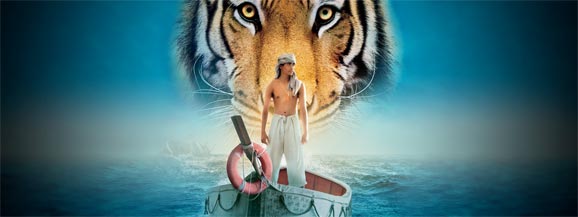‘Life of Pi’ (2012) Review: Choose Your Own Adventure

Ang Lee might be the most versatile filmmaker of our generation. He’s done; the kung fu epic, the comic book flick, a dramatic piece, and now an epic that tackles the topics of religion and life itself. It’s the kind of film that’s so difficult to talk about, simply because it says so much, and the handicap of being able to afford a single viewing (it deserves many). Through every shot, camera movement, edit, and piece of scenery, there is a statement about its theme. What is this incredibly ambitions premise you might ask? Well, I will reveal throughout the review, and it doesn’t come to one quickly when watching the film either. It comes like an epiphany, something worked toward with time applied, an investment. Pi is a boy growing up in a zoo in India, he has realized the brilliance of choice from a young age and takes full advantage of it. He is determined, motivated, and not an easy quitter. He spells out the decimal places of the mathematical equation Pi to distract classmates of his actual name. He also has a love for religion. He hasn’t quite yet found a singular path yet, though why should he, he’s young, there’s no rule against one living multiple ways of life. Pi simply finds something to love in everything, he loves hopelessly and unconditionally. When his family is forced to move from India, they bring their zoo animals with them, including one Bengal Tiger by the name of Richard Parker. When their Japanese cargo ship sinks, Pi is left floating adrift on a raft… with Richard Parker. Oh also I’ve never read the book and even if I had, I wouldn’t be comparing the two.
Life of Pi is drop dead gorgeous, but it doesn’t get lost in the visuals or the technical aspects of it’s storytelling. It’s able to have compelling characters and fish hook dialogue, despite suffering from that infectious voice over. The visuals are all extended metaphors on the screen, more than they are something to advance the story telling. The tale is defined by visual metaphors that change the characters life. Pi’s journey is our journey and we witness mythical sights, like the gathering of bio-luminescent jellyfish interrupted by the dance of a humpback whale. There is no sure thing that this is truth, but it’s beauty is no less because of it. There is this awesome technique of transitioning from setting to setting through a dissolve of the background followed by the foreground. A message, that a piece of us lingers no matter where we go. There’s a pretty awesome vision sequence that shows us a giant squid and sperm whale fight fractal into zoo animals, and a comic drawing that starts to breath. To put it simply, it’s pretty trippy, but when tackling the issues of the universe one can only expect such a cliche’.
Most of the film is spent with the audience floating on a raft in the middle of the ocean with Pi and Richard Parker. It’s more of a compelling setting than any film this year. Ang Lee shows us unimagined beauty on our own planet. Other films like Finding Nemo have tried to explore the beauty of the ocean before but not like this. Ang Lee gives us the horrid and the pleasing, and only through the surface of the water. We see it through a looking glass, we never become a part of it because we never can. The water is always reflecting the sky, giving the illusion that the characters are floating through the stars or the clouds, foreshadowed by a prior scene of Pi’s father doing the same thing during a swim. Earlier in the film Pi’s mother tells him and his brother a story of a girl whom opened her mouth and revealed the universe. The universe is inside all of us, as well as being around us. The sea and the sky are one in the same. During a vision that Richard Parker and Pi share, they see the universe within the water and sky. When Pi stares into the eyes of the Tiger he says he sees its soul, his father insisting it is his own emotions reflected back at him. It’s both, they share the same soul. That is why Pi fears and loves Richard Parker so, because he fears and loves himself as we all do.
Everything is everything is not the message the filmmaker wishes you to walk away with though, as made evidence by a conversation Pi has with his father. That believing in everything is the same as believing in nothing. Yes, there’s also a lot of for every good there is evil sort of thing going on. But what’s more important, is that Lee wants us to choose. Life of Pi proposes the question, what if the story doesn’t matter, but what’s behind it. Does that undermine the events of the tale? I say no, it’s like a religion, different fables same morals. Life of Pi doesn’t offer any answers to the meaning of life, but what it does is present an option, like religion, a path to take. You must choose your own adventure.
Rating:
What do you think? Leave a comment.











Yeah Ang Lee is such a legend, truly shown himself as a versatile director. I have been following his work since CTHD. Cheers for the review!
Did you watch this in 3D? All the reviews I’ve been reading is praising its visuals. This might be one of the very few films that I should watch 3D instead of 2D
It seems like a more philosophical Cast Away.